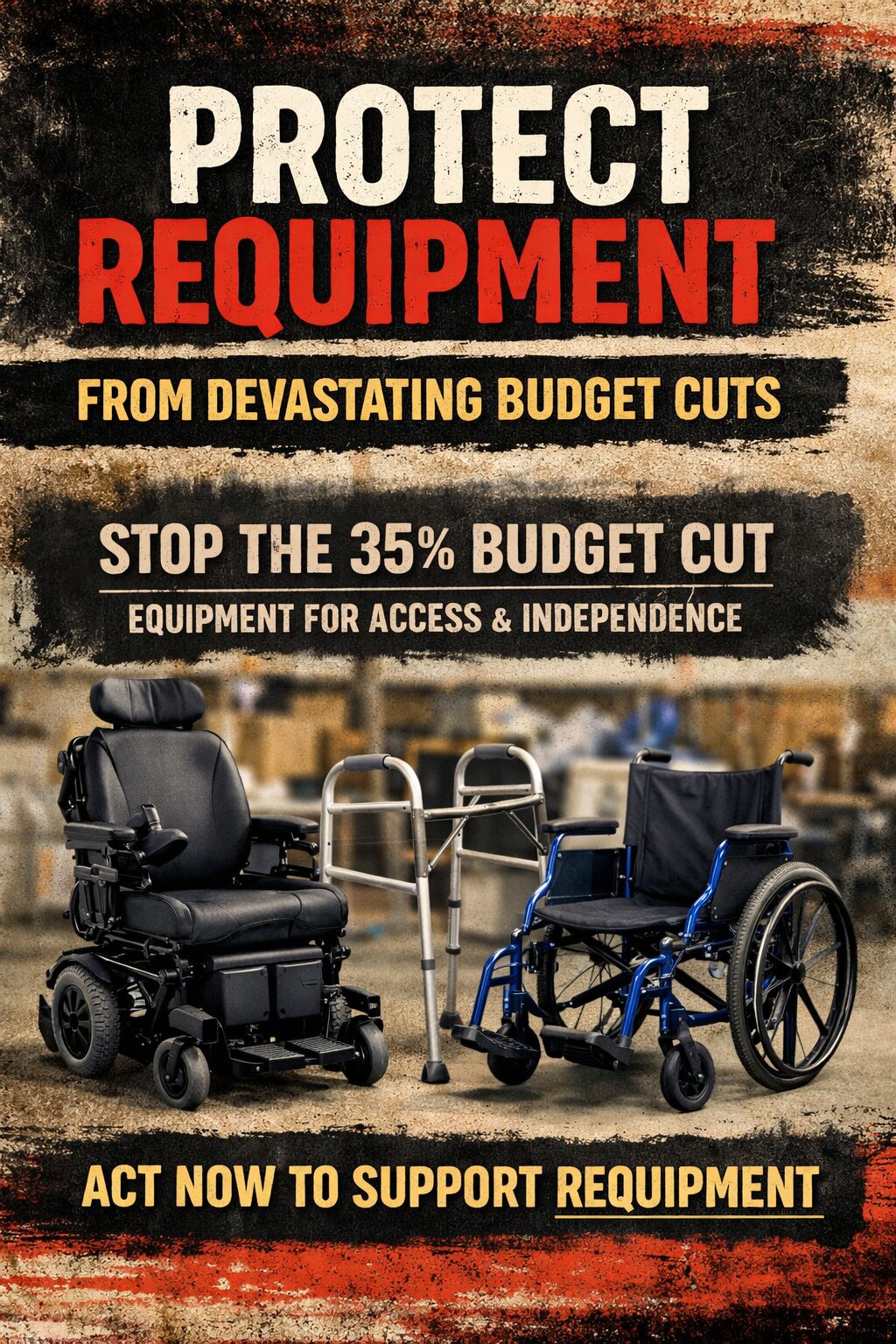Advocacy Alert: Protect REquipment from Devastating Budget Cuts

Advocacy Alert: Protect REquipment from Devastating Budget Cuts
REquipment, a critical durable medical equipment reuse program serving our community, is facing a proposed 35.7% budget cut. This reduction would significantly impact access to essential mobility and medical equipment for people with disabilities and older adults across Massachusetts.
REquipment helps ensure that wheelchairs, walkers, and other essential equipment are reused, refurbished, and redistributed to people who need them. It is practical, cost-effective, and community-centered. A cut of this size would limit access, increase wait times, and place additional strain on individuals and families who already face barriers to obtaining necessary equipment.
We cannot afford to move backward on access.
Take action today:
Click here to contact your legislators and ask them to protect funding for REquipment: https://dmereuse.org/budget-advocacy#/2/
Please take a moment to stand with our community and urge lawmakers to reject this harmful cut.
-------------------------------------------------
For consumers struggling with mental health problem help is on the way. The Biden administration has expanded availability.
HHS Finalizes Policies to Make Coverage More Accessible and Expand Behavioral Health Care Access for Millions of Americans in 2024
Today, the Biden-Harris Administration, through the Centers for Medicare & Medicaid Services (CMS), announced measures that will make coverage more accessible, expand behavioral health care access, simplify choice, and make it easier for millions of Americans to select a health plan in 2024.
“The Biden-Harris Administration has worked tirelessly to expand access to health insurance and lower health care costs for America’s families,” said HHS Secretary Xavier Becerra. “Today’s announcement of the 2024 Notice of Benefit and Payment Parameters Final Rule is a step forward toward creating a health care system which prioritizes equity, access, and affordability. HHS remains committed to removing barriers to care to ensure quality health care is within reach for everyone who needs it.”
“We’ve made great progress with record insured rates, but affordable health care remains a concern across the nation,” said CMS Administrator Chiquita Brooks-LaSure. “As we continue to work toward accessible and equitable health care for all Americans, the 2024 Notice of Benefit and Payment Parameters Final Rule we’re finalizing today will make it easier for consumers to access, choose and maintain the health coverage that best fits their needs.”
The 2024 Notice of Benefit and Payment Parameters Final Rule (final 2024 Payment Notice) finalizes standards for issuers and Marketplaces, as well as requirements for agents, brokers, web-brokers, and Assisters that help consumers with enrollment through Marketplaces that use the federal platform. These changes further the Biden-Harris Administration’s goals of advancing health equity by addressing the health disparities that underlie our health system, such as strengthening network adequacy standards and creating a new special enrollment period (SEP) for those who lose Medicaid or Children’s Health Insurance Plan (CHIP) coverage, among others. The rule also builds on the Affordable Care Act by expanding access to quality, affordable health coverage and care, especially behavioral health care, and making it easier to select and enroll in health coverage.
Making it easier to enroll in coverage
While the administration previously announced a temporary SEP for individuals losing Medicaid or CHIP until July 31, 2024 in recognition of the end of the continuous coverage requirement in Medicaid, the final rule establishes a permanent policy. Beginning January 1, 2024, Federally-facilitated Marketplaces (FFMs) and State-based Marketplaces (SBMs) will have the option to implement a new SEP for people losing Medicaid or CHIP coverage, allowing consumers to select a plan for Marketplace coverage 60 days before, or 90 days after, losing Medicaid or CHIP coverage. This SEP works to reduce gaps in coverage and allows for a more seamless transition into Marketplace coverage.
The final rule also allows Assisters to provide more convenient and efficient help to consumers. Assisters currently conduct direct outreach, education, and schedule follow-up appointments, but are generally prohibited from providing enrollment assistance upon an initial interaction if initiated by the Assister. Removing this barrier will make it easier for consumers to get help when enrolling in coverage. Additionally, this policy change will likely improve health literacy in rural and underserved communities and reduce burden on consumers, especially for consumers with a lack of access transportation, inflexible job schedules, and those who are immunocompromised.
Increasing access to health care services
Expanding access to behavioral health care remains a top priority for the Biden-Harris Administration. As part of that effort, the final rule includes two new essential community provider (ECP) categories that are critical to delivering needed behavioral health care: Substance Use Disorder Treatment Centers and Mental Health Facilities.
The final rule will also help expand access to care by extending the requirement for plans to contract with at least 35% of available ECPs in a plan’s service area to apply to two individual ECP categories: Federally Qualified Health Centers and Family Planning Providers. The overall 35% threshold requirement also remains in place. These changes, in conjunction with other expanded Network Adequacy requirements in the final rule, increase provider choice, advance health equity, and expand access to care for consumers who have low incomes, complex or chronic health care conditions, or who reside in underserved areas, as these consumers are often disproportionately affected by unanticipated costs associated with out-of-network providers and limited access to providers.
Simplifying choice and improving the plan selection process
The final rule includes provisions to make it easier for consumers to select a health plan that best fits their individual needs and budget by refining designs for standardized plan options. The final rule is also limiting the number of non-standardized plan options offered by issuers of qualified health plans (QHPs) through the FFMs and SBMs on the Federal Platform (SBM-FPs) to four in each area for the 2024 plan year. This will reduce plan choice overload while continuing to provide a robust number of options for consumers to help fit their health needs.
For more information on the final rule, consult the fact sheet: https://www.cms.gov/newsroom/fact-sheets/hhs-notice-benefit-and-payment-parameters-2024-final-rule
Joseph Tringali
Editor and Informational Advocate
Stavros Center for Independent Living
http://www.stavros.org
Advocacy Works when you get involved !
-------------------------------------------------
Help Ensure Requip funding will be in the state budget every year
The Requip program is a small state program with big impacts. The program collects lightly used durable medical equipment such as wheelchairs, power chairs, walkers, and an amazing assortment of durable medical equipment . The program has 5 partners throughout the state to pick up a and deliver the donated items. And it’s all free.
The problem is the state budget did not fund the program adequately. The program needs $500,000 annualized “provided that not less than $240, 000 shall not be expended for assistive technology services”. The line item is 4120 – 4000. This amount of money will keep the program safe.
This language will make sure they Requip funding will be in the state budget every year. Currently, we need to fight for the funding every year.
Read here for more information and call your representative to save this valuable program line item 4120 – 4000. We’ve got 2 days to make our voices heard.


Joseph Tringali
Editor and Informational Advocate
Stavros Center for Independent Living
http://www.stavros.org
Advocacy Works when you get involved !
-------------------------------------------------
Stavros is in favor of fair wages for hard-working PCAs.
Stavros is in favor of fair wages for hard-working PCAs. Many of our consumers depend on them to get out of bed, get dressed, and get on their way. Please support this action for your PCAs.

Joseph Tringali
Editor and Informational Advocate
Stavros Center for Independent Living
http://www.stavros.org
Advocacy Works when you get involved !
-------------------------------------------------
Long COVID
The news has been saturated by Covid and the effects of this pandemic. This includes the work world. Many employees have caught Covid since 2019. The effects of this virus can present itself in many forms from tiredness to incapability of getting out of bed. All of these symptoms affect the ability to work. This inability is covered by Title I of the ADA.
Please look at the link above for further information: https://www.nod.org/long-covid-is-a-disability-heres-how-to-ask-for-workplace-accommodations/
Joseph Tringali
Editor and Informational Advocate
Stavros Center for Independent Living
http://www.stavros.org
Advocacy Works when you get involved !
-------------------------------------------------
Accessible social media
There are many of us who are trying to give the latest news about advocacy, recreation activities, educational classes, etc. .. Whatever we do we want to make sure our readers have access to the information we are trying to give to our community. If we can't get the word out – what's the point? Please follow the link above and you will have answers to some of your questions. https://www.ucdavis.edu/news/accessibility-guides-aim-help-creators
Joseph Tringali
Editor and Informational Advocate
Stavros Center for Independent Living
http://www.stavros.org
Advocacy Works when you get involved !
-------------------------------------------------
Stavros is a Fragrance Free Place
For the safety of our visitors and employees we are requesting our visitors to help us stay a Fragrance Free Place. Please do NOT use fragrances when you visit our offices or attend any of our events.
Fragrance refers to any scent that is perceptible by others. It includes but is not limited to personal care products such as perfume, cologne, aftershave products, health care products, soaps, lotions, powders, and deodorants; laundry products such as detergents, fabric softeners, and dryer sheets; air “fresheners” that contain fragrance products; as well as any product that contains fragrance or scent.
For more information on why being fragrance free helps everyone, visit this website:
https://invisibledisabilities.org/ida-books-pamphlets/chemicalsensitivities/whygofragrancefree/

